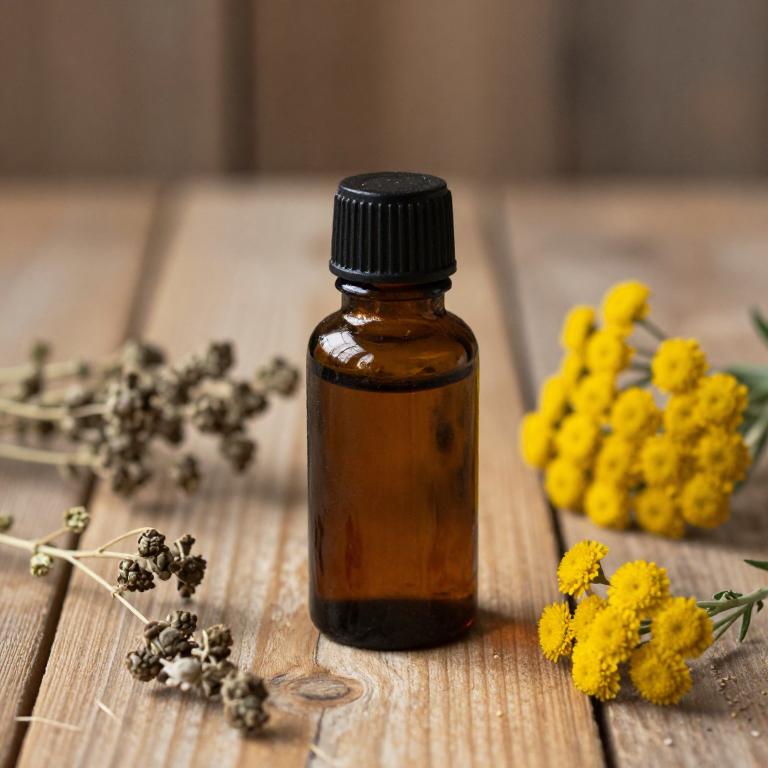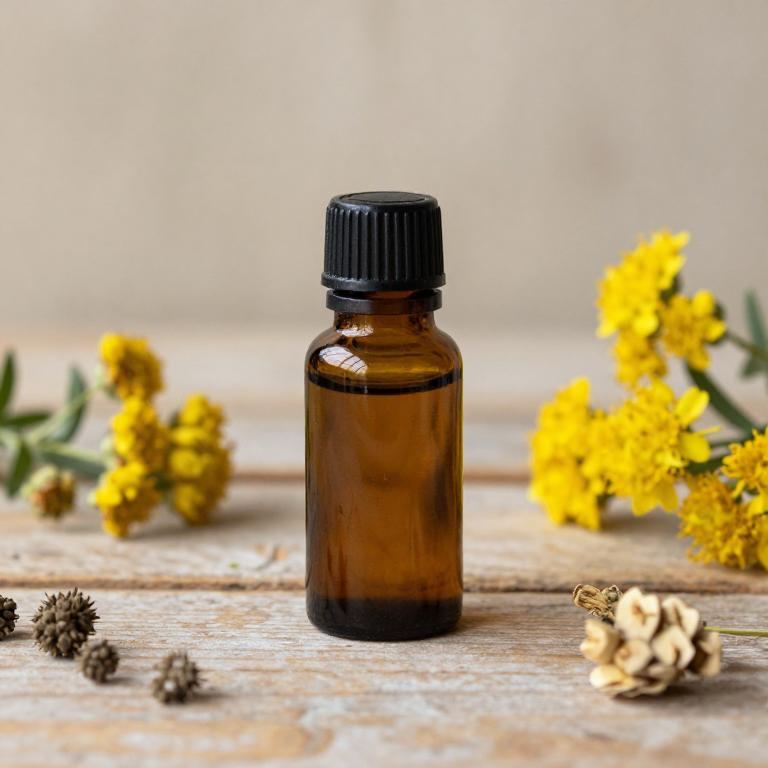10 Best Herbal Essential Oils For Tendinitis

Herbal essential oils have gained attention for their potential therapeutic benefits in managing tendinitis, a condition characterized by inflammation and pain in tendons.
Oils such as lavender, eucalyptus, and peppermint are commonly used due to their anti-inflammatory, analgesic, and cooling properties. These oils can be diluted with a carrier oil and applied topically to the affected area to reduce swelling and discomfort. Some studies suggest that aromatherapy with these essential oils may help improve circulation and promote tissue healing.
However, it is important to consult a healthcare professional before using essential oils, especially for chronic or severe cases of tendinitis.
Table of Contents
- 1. Turmeric (Curcuma longa)
- 2. Ginger (Zingiber officinale)
- 3. Salvia (Salvia officinalis)
- 4. Yarrow (Achillea millefolium)
- 5. Ceylon cinnamon (Cinnamomum zeylanicum)
- 6. Chaste tree (Vitex agnus-castus)
- 7. Stinging nettle (Urtica dioica)
- 8. Eucalyptus (Eucalyptus globulus)
- 9. St. john's wort (Hypericum perforatum)
- 10. Black pepper (Piper nigrum)
1. Turmeric (Curcuma longa)

Curcuma longa, commonly known as turmeric, contains a bioactive compound called curcumin, which is often extracted into essential oils for its potent anti-inflammatory and antioxidant properties.
These essential oils are used topically to alleviate symptoms of tendinitis by reducing inflammation and pain in affected tissues. The anti-inflammatory effects of curcumin help to inhibit the production of pro-inflammatory cytokines, which are often elevated in inflammatory conditions like tendinitis. When applied directly to the skin, curcuma longa essential oils can provide localized relief without systemic side effects.
However, it is important to use these oils in conjunction with other treatments and consult a healthcare professional for proper guidance.
2. Ginger (Zingiber officinale)

Zingiber officinale, commonly known as ginger, is widely used in herbal medicine for its anti-inflammatory and analgesic properties.
The essential oils extracted from ginger roots contain bioactive compounds such as gingerol and shogaol, which have been shown to reduce inflammation and pain. These oils can be applied topically to the affected areas to alleviate symptoms of tendinitis by inhibiting the production of inflammatory cytokines. However, it is important to dilute the essential oil with a carrier oil to prevent skin irritation.
While ginger essential oil shows promise in managing tendinitis, it should be used as a complementary therapy under the guidance of a healthcare professional.
3. Salvia (Salvia officinalis)

Salvia officinalis, commonly known as common sage, contains essential oils that have been traditionally used for their anti-inflammatory and analgesic properties.
These essential oils, particularly rich in compounds like thujone and cineole, may help reduce inflammation and pain associated with tendinitis by inhibiting pro-inflammatory pathways in the body. When applied topically, sage essential oil can provide localized relief and promote healing of inflamed tendons. However, it should be diluted with a carrier oil to prevent skin irritation and ensure safe use.
While preliminary studies suggest potential benefits, further research is needed to fully understand its efficacy and safety for treating tendinitis.
4. Yarrow (Achillea millefolium)

Achillea millefolium, commonly known as yarrow, contains essential oils that have been traditionally used for their anti-inflammatory and analgesic properties.
The essential oils derived from yarrow, particularly those rich in compounds like chamazulene and bisabolol, can help reduce inflammation and pain associated with tendinitis. These oils may support tissue repair and improve circulation, which is beneficial for healing inflamed tendons. When used topically, diluted yarrow essential oil can provide localized relief and may complement other treatments for tendinitis.
However, it is important to consult a healthcare professional before using essential oils, especially for chronic or severe cases.
5. Ceylon cinnamon (Cinnamomum zeylanicum)

Cinnamomum zeylanicum, commonly known as Ceylon cinnamon, produces a valuable essential oil that has been studied for its potential benefits in managing tendinitis.
The oil contains compounds like cinnamaldehyde and eugenol, which exhibit anti-inflammatory and analgesic properties, making them useful in reducing pain and inflammation associated with tendon injuries. When applied topically, the essential oil can help improve circulation and promote tissue repair, aiding in the recovery process. It is often diluted with a carrier oil before use to prevent skin irritation and ensure safe application.
While it may complement conventional treatments, it should not replace medical advice, and individuals with allergies or specific health conditions should consult a healthcare provider before use.
6. Chaste tree (Vitex agnus-castus)

Vitex agnus-castus, commonly known as chasteberry, is a herb traditionally used for its potential therapeutic properties, including its calming and hormonal balancing effects.
While it is not an essential oil, some essential oils derived from related plants may be used in aromatherapy to support overall wellness. For individuals with tendinitis, essential oils such as lavender, peppermint, and eucalyptus are often recommended for their anti-inflammatory and pain-relieving properties. However, it is important to consult a healthcare professional before using any essential oils, as they can interact with medications or have adverse effects.
While Vitex agnus-castus itself is not typically used as an essential oil, its herbal properties may complement other natural treatments for managing tendinitis symptoms.
7. Stinging nettle (Urtica dioica)

Urtica dioica, commonly known as stinging nettle, has been traditionally used for its anti-inflammatory and analgesic properties, making it a potential candidate for the management of tendinitis.
The essential oils derived from Urtica dioica contain bioactive compounds such as alpha-pinene, beta-pinene, and limonene, which exhibit anti-inflammatory and antioxidant effects. These oils may help reduce inflammation and pain associated with tendinitis when applied topically. However, further scientific research is needed to confirm their efficacy and safety in clinical settings.
Despite its traditional use, it is advisable to consult a healthcare professional before using Urtica dioica essential oils for tendinitis treatment.
8. Eucalyptus (Eucalyptus globulus)

Eucalyptus globulus, commonly known as Australian eucalyptus, is a popular source of essential oil that has been traditionally used for its anti-inflammatory and analgesic properties.
The essential oil contains compounds like cineole, which may help reduce inflammation and pain associated with tendinitis. When used topically, eucalyptus globulus oil can provide a cooling sensation that may aid in relieving muscle and joint discomfort. However, it should be diluted with a carrier oil to avoid skin irritation and should not be ingested.
While it may offer supportive relief, it is important to consult a healthcare professional before using it as a treatment for tendinitis.
9. St. john's wort (Hypericum perforatum)

Hypericum perforatum, commonly known as St. John's Wort, is a plant whose essential oils have been explored for their potential therapeutic effects on conditions like tendinitis.
The essential oils derived from this plant contain bioactive compounds such as hypericin and hyperforin, which are believed to possess anti-inflammatory and analgesic properties. These properties may help reduce inflammation and pain associated with tendinitis by modulating inflammatory pathways in the body. However, it is important to note that while some studies suggest a possible benefit, more clinical research is needed to confirm the efficacy and safety of Hypericum perforatum essential oils for this condition.
As with any herbal treatment, it is advisable to consult a healthcare professional before use, especially since St. John's Wort can interact with certain medications.
10. Black pepper (Piper nigrum)

Piper nigrum, commonly known as black pepper, contains essential oils that have shown potential in the management of tendinitis due to their anti-inflammatory and analgesic properties.
The essential oils derived from black pepper include compounds such as alpha-pinene and beta-caryophyllene, which may help reduce inflammation and pain in affected tendons. When applied topically, these oils can provide localized relief by stimulating blood circulation and reducing oxidative stress in the tissues. However, it is important to dilute the essential oils with a carrier oil to avoid skin irritation and ensure safe application.
While preliminary studies suggest benefits, more research is needed to fully understand the efficacy and safety of piper nigrum essential oils for treating tendinitis.